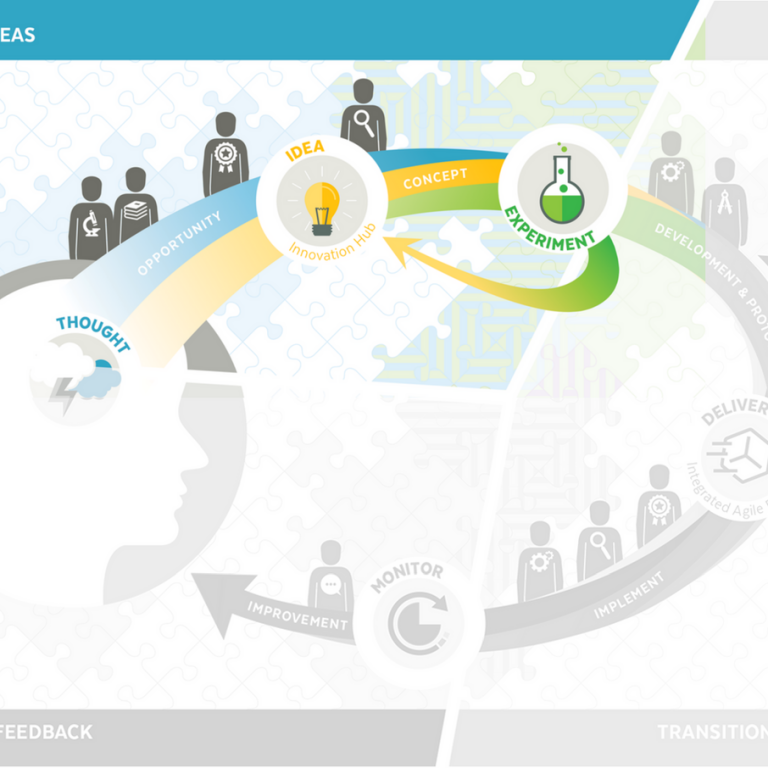 Change has never been easy. It takes a certain mindset to be able to accept constant change.
Change has never been easy. It takes a certain mindset to be able to accept constant change.To do it effectively you need to adopt the right tools, plan the right direction and do it at the right time. Incubate Ideas is about defining how all relevant internal and external innovation and transformation stakeholders can adopt this mindset. The following are potential level 2 functions within the Incubate Ideas phase.
Establish Innovation Management Practice
How do you collect, review, create, measure and scale innovation within and from outside your organisation? How do you direct this innovation-led growth and should you? What are the roles and responsibilities required and how are these implemented across organisational functions?
MBT provides capabilities to manage innovation by providing various ideation methodology options from the outset, so that the organisation can implement it in the most efficient and effective way.
Some of the capabilities include:
- Innovation Plan
- Innovation Design and Execution
- Knowledge Management
- Responsiveness and Change
- Leadership Attention to Transformation and Innovation
Develop Continuous Transformation Strategy
Defining the strategy is one thing, putting it in place is another. The strategy you choose depends on several factors and will evolve over time as these factors can shift.
How do you engage your innovation stakeholders and do they feel empowered and part of a whole?
MBT provides the solution to address this by linking the company strategy with existing processes and capabilities to identify how the organisation can execute their transformation plan efficiently and effectively.
Some of the capabilities include:
- Transformation Plan
- Strategy & Process Capability Linkage
- Business Architecture
- Transformation Design and Execution
- Technology Transformation
- Skills & Expertise
- Leadership Attention to Transformation and Innovation
Undertake Digital Transformation
Changing at a snail’s pace is no longer an option. A solution to increasing the speed of change is digitisation across the value-chain, incorporating social collaboration and idea management tools, to continuous delivery methods and scalable platforms.
MBT provides a structured value-chain of Thought-to-Reality. It becomes seamlessly integrated into the organisation’s culture, while continuously driving new improvements and innovation-led growth.
Some of the capabilities include:
- Improvement Design and Execution
- System Design and Modelling
- Technology Transformation
- Education and Learning
- Collaboration and Communication
Plan and Execute Change Management for Change
Change Management is part of the process to ensure potential risk is mitigated and business continuity is aligned with improvement and innovation initiatives. The involvement of all key stakeholders within the organisation is also crucial, as they would act as the catalyst for change during this process.
MBT introduces the governance and mechanism of synergising people, process and technology by ensuring change management activities are properly planned and seamlessly integrated throughout the transformation process.
This mechanism allows organisations to continue their innovation process, providing structure and confidence in the project and reducing concern regarding risk.
Some of the capabilities include:
- Stakeholders Management
- Process Roles and Responsibilities
- Process Management Control
- Governance, Control and Measurement
- Accountability
Capabilities to Notice in this Phase
Strategy
-
Transformation Plan
-
Strategy and Process Capability Linkage
-
Business Architecture
-
Innovation Plan
-
Stakeholder engagement
-
Process
-
Process Management Decision Making
-
Process Roles and Responsibilities
-
Process Metrics and Performance Linkage
-
Process Management Standards
-
Process Management Controls
-
Methods
-
Improvement Design and Execution
-
Transformation Design and Execution
-
Innovation Design and Execution
-
Governance, Control and Measurement
-
Project and Program Management
-
Technology
-
System Design and Modelling
-
Tool Implementation and Execution
-
System and Tool Control and Measurement
-
Technology Transformation
-
Project and Program Implementation
-
People
-
Skills and Expertise
-
Knowledge Management
-
Education and Learning
-
Collaboration and Communication
-
Accountability
-
Culture
-
Responsiveness and Change
-
Values and Beliefs
-
Attitudes and Behaviours
-
Leadership Attention to Transformation and Innovation
-
Centre of Excellence (CoE) and Social Network
-
